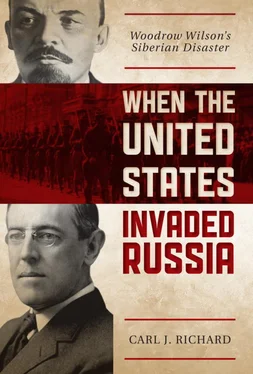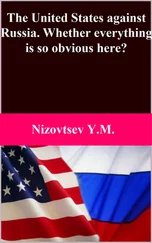Peyton C. March, The Nation at War (Garden City, N.Y.: Doubleday, 1932), 131–32.
U.S. Department of State, Papers Relating to the Foreign Relations of the United States, Russia, 1919 (Washington, D.C.: Government Printing Office, 1937; reprint, New York: Kraus, 1969), William S. Graves to Adjutant General Peter Harris, May 4, 492–93; Arthur S. Link, ed., The Papers of Woodrow Wilson (Princeton, N.J.: Princeton University Press, 1966–1994), William S. Graves to Adjutant General Peter Harris, May 4, 1919, vol. 58, 570.
U.S. Department of State, Foreign Relations, Russia, 1919 , Boris Bakhmetev to Robert Lansing, May 10, 495–96; Henri de Bach to DeWitt C. Poole, October 13, 531.
William S. Graves, America’s Siberian Adventure, 1918–1920 (New York: Cape and Smith, 1931), 110, 112; Link, Papers of Woodrow Wilson , Fred McAver and Others to Wilson, August 20, 1919, vol. 62, 433–34; Norman E. Saul, War and Revolution: The United States and Russia, 1914–1921 (Lawrence: University Press of Kansas, 2001), 326. According to Secretary of War Newton Baker, 8,477 American soldiers, including support personnel, were stationed in Siberia in September 1919. See Robert K. Murray, Red Scare: A Study of National Hysteria, 1919–1920 (New York: McGraw-Hill, 1955), 45.
U.S. Department of State, Foreign Relations, Russia , 1919 , John K. Caldwell to Robert Lansing, March 3, 473; William S. Graves to Adjutant General Peter Harris, May 4, 492; Clerk to Robert Lansing, May 19, 499–500.
Ibid., Frank L. Polk to Commission to Negotiate Peace, May 9, 494; Robert J. Maddox, The Unknown War with Russia: Wilson’s Siberian Intervention (San Rafael, Calif.: Presidio, 1977), 125.
Link, Papers of Woodrow Wilson , Newton D. Baker to Wilson, May 21, 1919, vol. 59, 409–10; Graves, America’s Siberian Adventure , 159–60.
Link, Papers of Woodrow Wilson , Robert Lansing to Wilson, March 22, 1919, vol. 56, 184; Carol Willcox Melton, Between War and Peace: Woodrow Wilson and the American Expeditionary Force in Siberia, 1918–1921 (Macon, Ga.: Mercer University Press, 2001), 47; Graves, America’s Siberian Adventure , 160; U.S. Department of State, Foreign Relations, Russia, 1919 , Notes of a Meeting Held at President Wilson’s House, Place des Etats-Unis, Paris, May 14, 496–97.
U.S. Department of State, Foreign Relations, Russia, 1919 , John K. Caldwell to Robert Lansing, May 29, 504; Maddox, Unknown War with Russia , 100; Graves, America’s Siberian Adventure , 188.
Maddox, Unknown War with Russia , 101–3; Robert L. Willett, Russian Sideshow: America’s Undeclared War, 1918–1920 (Washington, D.C.: Brassey’s, 2003), 227–29, 237.
Melton, Between War and Peace , 177; N. G. O. Pereira, White Siberia: The Politics of Civil War (Montreal: McGill-Queen’s University Press, 1996), 157–68.
Graves, America’s Siberian Adventure , 241–42, 246; Roy MacLaren, Canadians in Russia, 1918–1919 (Toronto: Macmillan of Canada, 1976), 277; Link, Papers of Woodrow Wilson , William S. Graves to Adjutant General Peter Harris, June 21, 1919, vol. 62, 84–86.
Graves, America’s Siberian Adventure , 127–29; Willett, Russian Sideshow , 182–83; R. Ernest Dupuy, Perish by the Sword: The Czechoslovakian Anabasis and Our Supporting Campaigns in North Russia and Siberia, 1918–1920 (Harrisburg, Pa.: Military Service Publishing, 1939), 236.
Graves, America’s Siberian Adventure , 266; Ilya Somin, Stillborn Crusade: The Tragic Failure of Western Intervention in the Russian Civil War, 1918–1920 (New Brunswick, N.J.: Transaction, 1996), 149.
Graves, America’s Siberian Adventure , 169–71.
Ibid., 171–73.
Ibid., 147, 153–55.
Ibid., 156, 238.
Ibid., 214, 248, 317, 325.
Ibid., 103, 110.
Ibid., 117–18.
Ibid., 287.
Ibid., 104–5; U.S. Department of State, Papers Relating to the Foreign Relations of the United States, Russia, 1918 (Washington, D.C.: Government Printing Office, 1931–1932; reprint, New York: Kraus, 1969), Alfred Thomson to Robert Lansing, December 9, vol. 2, 457; U.S. Department of State, Foreign Relations, Russia, 1919 , Colonel Robert Eichelberger to Director of Military Intelligence, March 31, 486; Paul S. Reinsch to Robert Lansing, May 18, 499; August 8, 514.
U.S. Department of State, Foreign Relations, Russia, 1919 , William S. Graves to Adjutant General Peter Harris, February 25, 469–72; Roland S. Morris to Frank L. Polk, March 8, 475–78; Frank L. Polk to John K. Caldwell, March 8, 478; Frank L. Polk to Commission to Negotiate Peace, March 18, 482; May 14, 497.
Ibid., Charles H. Smith to Frank L. Polk, July 15, 511; Paul S. Reinsch to Robert Lansing, August 8, 513; Roland S. Morris to Robert Lansing, August 14, 514; William S. Graves to Adjutant General Peter Harris, September 27, 521; John K. Caldwell to Robert Lansing, September 30, 522–23; Robert Lansing to Ernest L. Harris, October 3, 526; Henri de Bach to DeWitt C. Poole, October 13, 530.
Ibid., William S. Graves to Adjutant General Peter Harris, June 26, 508–9.
Graves, America’s Siberian Adventure , 255.
U.S. Department of State, Foreign Relations, Russia, 1919 , William S. Graves to Adjutant General Peter Harris, September 16, 515.
Graves, America’s Siberian Adventure , 259–61.
U.S. Department of State, Foreign Relations, Russia, 1919 , Adjutant General Peter Harris to William S. Graves, September 26, 519; Maddox, Unknown War with Russia , 108–9; Graves, America’s Siberian Adventure , 257–58.
U.S. Department of State, Foreign Relations, Russia, 1919 , Robert Lansing to Ernest L. Harris, October 2, 525; Charles H. Smith to Robert Lansing, October 8, 527–28; Graves, America’s Siberian Adventure , 251.
Graves, America’s Siberian Adventure , 260–61.
Ibid., 261–62; U.S. Department of State, Foreign Relations, Russia, 1919 , Charles H. Smith to Robert Lansing, October 26, 539; Charles D. Tenney to Robert Lansing, October 29, 541.
Graves, America’s Siberian Adventure , 263–65; Willett, Russian Sideshow , 259–60, 268.
U.S. Department of State, Foreign Relations, Russia, 1919 , William S. Graves to Adjutant General Peter Harris, July 10, 206–7; Paul S. Reinsch to Frank L. Polk, July 19, 209; Robert Lansing to Commission to Negotiate Peace, August 29, 212–13.
Читать дальше












